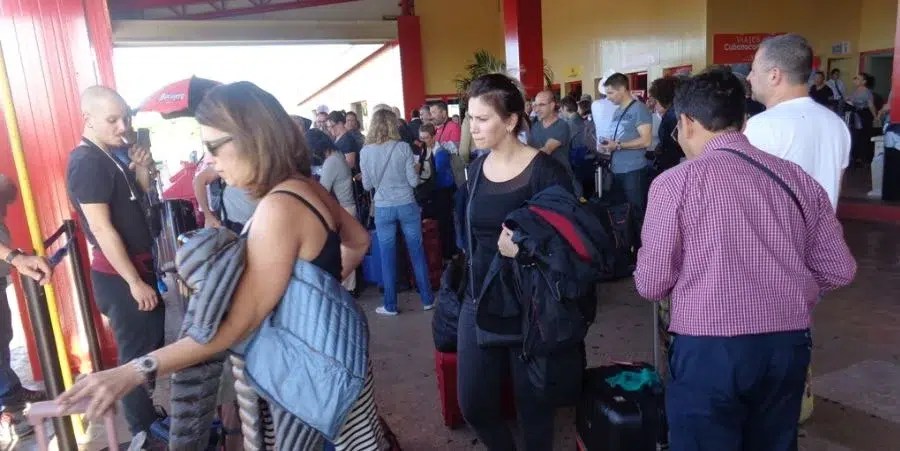MIAMI, United States. – The Government of Canada updated its travel advisory for Cuba last Friday, suggesting “a high degree of caution” for nationals who decide to travel to the Island “due to shortages of basic items, including food, medicine, and fuel.”
The official notice reiterates recommendations regarding safety, health, transportation, telecommunications, and entry and exit requirements. It specifies that in tourist hubs such as Jardines del Rey —Cayo Coco, Cayo Guillermo, Cayo Paredón Grande, and Cayo Santa María— and in destinations like Cayo Largo del Sur, the Guardalavaca strip between Playa Pesquero and Playa Baní, Jibacoa, Marea del Portillo, Playa Ancón, Playa Santa Lucía, and the Varadero peninsula, “normal security precautions” are sufficient.
On security matters, Canada warns that “incidents of violent crime are not common, but assaults (…) can occur during a home invasion or a mugging.” It further recommends staying in places with good security and keeping doors and windows locked.
Regarding sexual assaults, it notes that incidents have occurred against Canadian women, even in resorts, and stresses the need to report them immediately to both Cuban authorities and the Canadian representation.
On fraud and overpricing, the advisory specifies that “some businesses, including taxis and classic car rentals, may attempt to charge exorbitant prices,” and warns of irregular operators throughout the country, including at Havana’s airport: “Across the country, including Havana’s International Airport, fraudulent tour agents and taxi drivers operate. There have been thefts of luggage from taxi trunks.”
It also cautions about the persistence of sex workers: “In bars, sex workers, including minors, can be very persistent and intrusive with tourists who reject their advances. Foreigners, including Canadians, have been victims of theft after engaging in sexual relations, and some have faced accusations of sex with minors.”
The advisory also highlights the energy crisis and its daily effects: “To reduce pressure on the electrical grid, Cuba schedules long daily power cuts. Sometimes unexpected nationwide blackouts occur that can last more than 24 hours.” This is compounded by fuel and basic goods shortages: “Fuel shortages affect a wide range of services. Traveling around the island is extremely difficult. Public transportation services, including taxis, are often disrupted, leaving tourists with few options to get around. Some travelers have been temporarily stranded with a rental car. Long lines at gas stations are common and have led to altercations.”
In communications, the document is blunt: “Canadian cell phones may not work, even in major cities,” and it reminds travelers that internet access is limited and may be blocked by the authorities. Regarding demonstrations, it stresses: “All demonstrations against the Government are illegal,” and therefore recommends not participating, avoiding protest areas, and following official instructions.
The advisory includes precautions for aquatic and recreational activities and revisits the issue of internal mobility. On buses, it states: “Public buses are unreliable, scarce, overcrowded, and poorly maintained.” On taxis, it urges travelers to use only those “officially identified,” avoid hailing them on the street, not share with strangers, and agree on the fare before departing. Rail service is described as unreliable and slow.
Canada also warns its nationals to bring personal items and medicines due to local shortages. On health, it reports that “cases of hepatitis A have been reported in travelers returning from Cuba,” recommending vaccination and food safety and hygiene measures. Regarding the healthcare system, it warns: “Facilities are in poor condition. They lack basic medicines, supplies, and medical equipment.” It also notes severe limitations in mental health care and ambulance services, and advises travelers to have insurance with evacuation and hospitalization coverage, as well as to bring sufficient medication in its original packaging. This month’s update comes after the August adjustment, which had already highlighted risks related to weather, possible demonstrations, and petty crime, in addition to reminders about compliance with local laws.
Recibe la información de CubaNet en tu celular a través de WhatsApp. Envíanos un mensaje con la palabra “CUBA” al teléfono +1 (786) 316-2072, también puedes suscribirte a nuestro boletín electrónico dando click aquí.






 HAZ TU DONACIÓN AQUÍ
HAZ TU DONACIÓN AQUÍ







